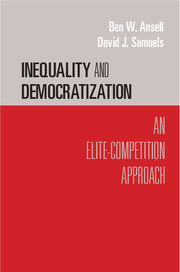Book contents
- Frontmatter
- Contents
- List of Tables
- List of Figures
- Preface
- I Introduction
- 2 Inequality, Development, and Distribution
- 3 Actors and Interests
- 4 An Elite-Competition Model of Democratization
- 5 Assessing the Relationship between Inequality and Democratization
- 6 Inequality and Democratization: Empirical Extensions
- 7 Democracy, Inequality, and Public Spending: Reassessing the Evidence
- 8 Democracy, Redistribution, and Preferences
- 9 Conclusion
- Bibliography
- Index
Preface
Published online by Cambridge University Press: 05 January 2015
- Frontmatter
- Contents
- List of Tables
- List of Figures
- Preface
- I Introduction
- 2 Inequality, Development, and Distribution
- 3 Actors and Interests
- 4 An Elite-Competition Model of Democratization
- 5 Assessing the Relationship between Inequality and Democratization
- 6 Inequality and Democratization: Empirical Extensions
- 7 Democracy, Inequality, and Public Spending: Reassessing the Evidence
- 8 Democracy, Redistribution, and Preferences
- 9 Conclusion
- Bibliography
- Index
Summary
In light of recent experience, the question is not whether democracy will rob property owners of their property, but whether propertied interests will rob common men of their chief weapon of defense against exploitation, democracy.
Benjamin E. Lippincott ([1938] 1974, 238)Our intellectual journey began with a question Samuels raised to Ansell. Long a student of Brazilian politics, Samuels also taught a graduate seminar on democratization. Reading Boix and Acemoglu and Robinson left Samuels scratching his head, because Brazil confounded the “redistributive” arguments in both books. Brazil is notoriously one of the world's most unequal countries, yet it had democratized at precisely the moment when inequality peaked. Samuels found it hard to reconcile what he knew about Brazil with what these “median-voter” models of regime change were telling him, and he began to hound Ansell for his insights into the political economy literature on redistribution. Was Brazil merely an outlier?
We soon discovered the Vanhanen (2000) data on land inequality and the Bourguignon and Morrisson (2002) data on income inequality, generated Gini coefficients from them, and then correlated those Ginis against Polity IV data and ACLP's regime-type data. To our surprise, we discovered a positive correlation between the level of income inequality and whether an autocracy transitioned to democracy. At that point, we had no explanation for this finding, which would not go away no matter how much we tortured the data. Yet we reasoned at that point that, to the extent that the correlation held up, regime change could not be a function of elites' fear of the poor.
We kept returning to the fact that redistributivist theories seemed to misinterpret what a Gini coefficient looks like in the real world, particularly overlooking the fact that Kuznets (1955) established decades ago—that in a poor but developing society, a low Gini coefficient does not indicate the presence of a large middle class. Quite the opposite. To the extent that high Gini are correlated with regime change and high Ginis indicate the presence of a sizable middle class, regime change is not a redistributive game between the median voter and the autocratic elite, but a game played between relative economic elites, all of whom have incomes well above the mean.
- Type
- Chapter
- Information
- Inequality and DemocratizationAn Elite-Competition Approach, pp. xv - xviiiPublisher: Cambridge University PressPrint publication year: 2014



